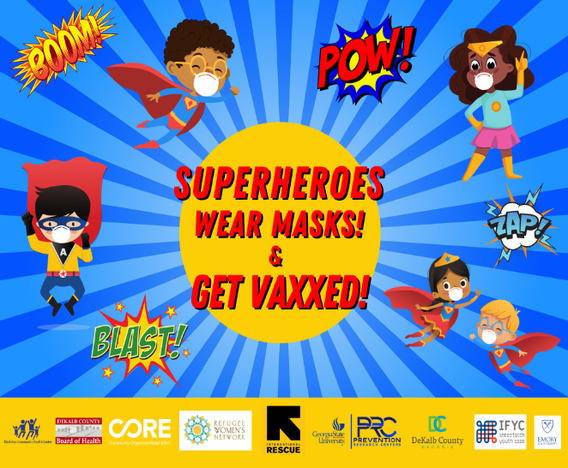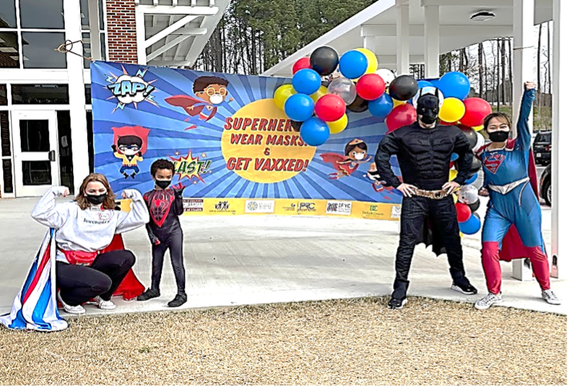Starting in August 2021, the Food and Drug Administration began approving pediatric COVID-19 vaccines, starting with ages 16 and up, and approving other age groups throughout 2021 and 2022. As of May 2023, the CDC reports that the proportion of children under-the-age of 18 who have completed their COVID-19 primary series continues to lag behind adults, with less than 20% obtaining bivalent boosters. Parental COVID-19 vaccine acceptance or hesitancy is influenced by multiple factors, including:
- Perceived risk/benefit of the vaccination versus possible health consequences of COVID-19 illness
- Lack of trust in government systems and processes (i.e., testing and approval of vaccines)
- Exposure to misinformation
- Peer/community pressure to get the vaccine or not get the vaccine
- Religious beliefs
- Community leaders
- Socio-economic factors such as transportation, health insurance, etc.
Decision-making for parents from refugee, immigrant, and migrant communities can be further complicated by language barriers that make it more difficult to obtain accurate and reliable information from trusted sources. As trusted neighborhood institutions, schools can play an important role in increasing parental vaccine acceptance and decreasing vaccination barriers. The International Rescue Committee (IRC) in Atlanta and Tucson, along with local public health departments, community partners, and schools, designed innovative pediatric vaccination and health education campaigns during the "Back-to-School" period in late summer and early fall to increase vaccine equity in RIM children and families.
Back to School Events in Atlanta
In January 2022, IRC Atlanta partnered with Refugee Women’s Network, Emory University Office of Spiritual and Religious Life, New American Pathways, CORE, Georgia State University Prevention Research Centers, Interfaith Youth Core, Clarkston Community Health Center, DeKalb County and DeKalb Board of Health to hold a Superhero Back-to-School vaccination event at Clarkston’s Indian Creek Elementary School, which serves students from 30 different countries, speaking more than 25 languages. Clarkston’s Social Vulnerability Index (SVI) is among the top 8% in the United States, highlighting the need for a dynamic intervention.

Prior to the Superhero themed Back-to-School event IRC and its partners created multi-lingual flyers, hosted webinars, posted on social media, and conducted mainstream media and school outreach.
During the event volunteers dressed up as superheroes, hosted fun activities, and handed out superhero masks to students – calling them superheroes for protecting their families and friends from COVID-19. In addition to vaccines, multi-lingual COVID-19 fact sheets, $100 gift card incentives, gift bags, and prizes were handed out. The school and partners updated respective social media accounts throughout the event, to highlight students’ vaccine journeys to inspire more to get vaccinated.

At this event, 160 people were vaccinated with about 50% of individuals vaccinated receiving their first COVID-19 vaccine. This event was so successful that it was replicated multiple times throughout 2022 and 2023 as vaccinations for children of different ages became available and as new school years began. Currently, the IRC in Atlanta is repeating these events in early fall as recurring “Back-to-School” events.
Back to School Events in Tucson
Inspired by Atlanta’s success, the IRC Tucson partnered with the Pima County Health Department, Tucson Unified School District, Islamic Circle of North America, Tucson Refugee Ministries, ELFA, and Priority Medical Group to hold its own Superhero themed Back-to-School pediatric vaccine campaign. IRC Tucson conducted outreach with 188 community partners and leaders to increase event visibility. The team created event flyers in eight languages and posted them in faith centers, ethnic grocery stores and restaurants, apartment complexes, and health centers, and sent them via RIM Community WhatsApp groups. Around 250 people attended the event, and 55 vaccinations were administered with 40 pediatric vaccinations. The event featured and hosted health providers (including health providers specialized in refugee health), had children’s activities, and partnered with other organizations to provide backpacks, school supplies, food boxes, and resource referral information.

IRC Atlanta and Tucson’s Superhero-themed Back-to-School vaccination and health education events were designed to appeal to students, while also acknowledging student’s bravery in getting vaccines, as well as being heroic in protecting their families and community. The events were designed to be Back-to-School Fairs where vaccinations were one of the many offerings along with the distribution of backpacks and school supplies, dental checks, health checks, games, and connection to other community services.
What Strategies Made These Events Successful?
- Involving the Community in Event Planning and Design: Many community partners were needed to ensure that the events could offer a wide array of services and that there were enough people to staff the event. In addition to what might be considered traditional partners like school districts and public health departments, outreach was done to engage ethnic community-based organizations in the design and planning of the event. These organizations provided critical feedback on how the event could best serve and appeal to RIM community members, including reviewing materials to make sure they were culturally appropriate and best positioned to reach community members. In IRC Atlanta, student voices were included as well, such as in the design of the flyers.
- Choosing a Place that is Known, Trusted, and Easy to Access: In the Atlanta area, events were held in local schools which also serve as neighborhood hubs, linking students and families to each other and providing a sense of connection and community. IRC Atlanta was also able to get school districts to help with transporting students to events to decrease transportation barriers. In Tucson, the event was held at the Tucson Refugee Ministries’ community center which is centrally located and next to apartment complexes with large numbers of RIM families, making it easy and convenient for families to walk to the event.
- Hiring Staff from the Community Being Served: To increase trust, broaden linguistic accessibility, and to help ensure cultural relevance, it is important for the events to have numerous staff from the communities being served. IRC in Atlanta and Tucson were able to deploy many culturally and linguistically diverse staff, that were joined by staff from other diverse organizations, ensuring that large numbers of languages were accessible at the event and that attendees could recognize people from their community at the event.
- Providing Lead Time to Circulate Information: Outreach materials were created and translated about a month before the event, and provided in numerous formats including flyers, social media posts, and images (.jpgs) that could be shared via WhatsApp. IRC Tucson developed a targeted list of grocery stores, faith-based institutions, ethnic community-based organizations, and small businesses where large numbers of RIM community members frequented and where information could be disseminated.
- Providing Opportunities for Questions Ahead of the Event: To build trust and decrease vaccine hesitancy, both IRC Atlanta and IRC Tucson offered question and answer sessions ahead of the event so community members could ask questions. These events were staffed by trusted medical professionals from the community. For example, in Tucson, a Syrian pediatrician held a Q&A on pediatric vaccines in Arabic and on WhatsApp so that women were able to ask questions and receive trusted information.
- Making the Event Fun: The Back-to-School events were designed to be fun for children and families with games, grab bags, staff dressed like superheroes, and their own chance to get a superhero mask and picture after getting vaccinated. In Tucson, food and face painting were offered along with culturally relevant activities like henna hand painting.
- Making the Event Meaningful: Some RIM families with lower incomes may struggle with basic needs. IRC Atlanta and Tucson ensured these events also had opportunities for families to get connected to necessary resources and services, as well as offering direct assistance to meet basic needs. Both sites offered backpacks and school supplies, while the IRC in Tucson also had food baskets available, and the IRC in Atlanta offered $100 gift cards so families could better meet basic needs.
The period before school starts can be a valuable opportunity to reach RIM communities with needed vaccinations and health information given that are already focused on preparing their students for the upcoming school year. In communities with lower incomes and high Social Vulnerability Indexes, Back-to-School events can be trusted and accessible ways to help families get needed vaccinations while also meeting other basic needs and connecting families to services. Successful Back-to-School vaccination events in RIM communities need significant lead time to build trust and a broad base of community partners, including involvement from RIM communities from the beginning. Event organizers should work to overcome access barriers such as language and transportation, while also making the event fun and engaging for the community.